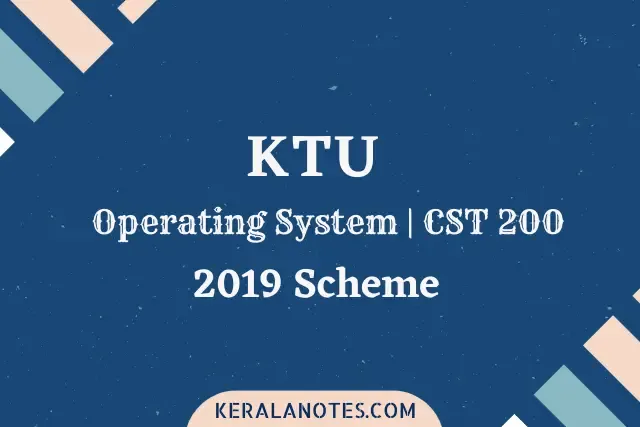KTU OS Operating systems CST200 is one of the core subjects of CSE. Operating system analysis is essential to understand the overall function, performance, and functional transfer of a computer system, and to differentiate functions between hardware and software. This course introduces memory management, device management, process management, file management, and security and protection algorithms available on an operating system.
This course helps you understand the basics of any operating system design so that you can diagnose and solve many problems in the operating system by expanding the features of the operating system and properly managing system resources. . You can learn KTU topics through our excellent research material including notes, presentations and final question papers, easily available on our website (www.keralanotes.com).
| Board | KTU |
| Scheme | 2019 New Scheme |
| Year | Second Year |
| Semester | S4 Computer Science |
| Subject | CST200 | Operating Systems Notes |
| Credit | 4 Credit |
| Category | KTU S4 Computer Science |
KTU S4 CSE Operating Systems | CST200 | Notes (2019 Scheme)
Module 1
Module 1 - Syllabus
Introduction: Operating system overview – Operations, Functions, Service – System calls, Types – Operating System structure - Simple structure, Layered approach, Microkernel, Modules – System boot process.
Module 1 - Notes
Module 1 Operating System | CST200 PDF Notes
Module 1 Operating System | CST200 HANDWRITTEN Notes
Module 2
Module 2 - Syllabus
Processes: Process states, Process control block, threads, scheduling, Operations on processes - process creation and termination – Inter-process communication - shared memory systems, Message passing systems.
Process Scheduling: Basic concepts- Scheduling criteria -scheduling algorithms- First come First Served, Shortest Job Firs, Priority scheduling, Round-robin scheduling
Module 2 - Notes
Module 2 Operating System | CST200 PDF Notes
Module 2 Operating System | CST200 HANDWRITTEN Notes
Module 3
Module 3 - Syllabus
Process synchronization: Race conditions – Critical section problem – Peterson’s solution, Synchronization hardware, Mutex Locks, Semaphores, Monitors – Synchronization problems - Producer-Consumer, Dining Philosophers and Readers-Writers.
Deadlocks: Necessary conditions, Resource allocation graphs, Deadlock prevention, Deadlock avoidance – Banker’s algorithms, Deadlock detection, Recovery from deadlock.
Module 3 - Notes
Module 3 Operating System | CST200 PDF 1 Notes
Module 3 Operating System | CST200 PDF 2 Notes
Module 4
Module 4 - Syllabus
Memory Management: Concept of address spaces, Swapping, Contiguous memory allocation, fixed and variable partitions, Segmentation, Paging. Virtual memory, Demand paging, Page replacement algorithms.
Module 4 - Notes
Module 4 Operating System | CST200 PDF Notes
Module 4 Operating System | CST200 PDF 2 Notes
Module 5
Module 5 - Syllabus
File System: File concept - Attributes, Operations, types, structure – Access methods, Protection. File-system implementation, Directory implementation. Allocation methods.
Storage Management: Magnetic disks, Solid-state disks, Disk Structure, Disk scheduling, Disk formatting.
Module 5 - Notes
Module 5 Operating System | CST200 PDF 1 Notes
Module 5 Operating System | CST200 PDF 2 Notes
KTU S4 CSE Related Links
| KTU S4 CSE Syllabus | Click Here |
| KTU S4 CSE Study Notes | Click Here |
| KTU S4 CSE Reference Textbook | Click Here |
| KTU S4 CSE Previous Year Solved Questions | Click Here |
| KTU S4 CSE Study Materials | Click Here |
Other Related Links
| MAT 206 - Graph Theory | Click Here |
| CST 202 - Computer Organization and Architecture | Click Here |
| CST 204 - Database Management Systems | Click Here |
| CST 206 - Operating System | Click Here |
| EST 200 - Design and Engineering | Click Here |
| HUT 200 - Professional Ethics | Click Here |
| MNC 202 - Constitution Of India | Click Here |
| CSL 202 - Digital Lab | Click Here |
| CST 206 - Operating Systems Lab | Click Here |







